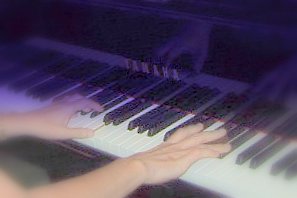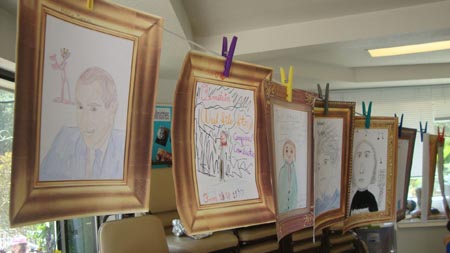

PRACTICING FUNDAMENTALS
Many parents express frustration about getting their children to practice, so here are a few of my comments addressing this challenging issue. This year I celebrate my 33rd year of teaching, so I’ve put together a few thoughts garnered from the hundreds of students and thousands of lessons that I’ve taught. I hope it will contribute some insight that results in a satisfying musical experience for my piano families. I think that many families feel that they are the only ones experiencing ‘the practice problem.’

Student art work decorates the reception
2. In piano the majority of the learning is done at home! This is not the case for all the other activities where is learning is done in the class. Once the day’s gymnastics class is over, the moves are put aside until the next lesson. This often results in the need for several classes per week , in order to be able to develop the motor skills and the muscle strength. However, piano lessons are only once a week. The small motor skill development, the hand/eye co-ordination cannot develop in the one short lesson per week. It has to be done at home - daily.
3. You can’t cram piano. We are all familiar with cramming for exams in school. Yes, it’s possible. But it’s not possible to cram work outs at the gym. Few people can miss their the gym workouts for a month and then spend 4 hours a day for one week to get back in shape! Little and often is the rule. It’s just the same for piano – it’s motor skills that are involved.
4. If you belong to some sort of team – either sports or academic – you ‘perform’ once a week. Football practice maybe twice a week, and every weekend there’s a ‘performance’ when you’re tested on your skills, some newly acquired: you are assessed by your coach, your peers and your cheering parents. Piano students usually get less than a handful of opportunities to perform each year. So the motivation to keep practicing each day is vastly different in nature from other activities.
5. Other student activities may take up to six hours during the week. Every student of mine has other activities besides piano. When you consider the time that taking piano lessons takes up in your household please reckon the time of the lesson plus the daily practice and see how it compares to other activities your child is involved in.
6. So learning the piano is very different from most after school activities. As your piano teacher all I have for weekly communication with parents are the assignment books. I try to be specific as how to practice, what to practice. Many parents have no musical knowledge, and I make sure that the student knows how to tackle a piece, or a portion of a piece before they leave the studio. Parents can help by ensuring that the student reads the assignment each and every day. Instructions such as ‘count out loud’ or ‘listen to the CD’ or ‘play this measure 5 times per day’ are obvious, and they are what is needed for the student to learn the piece as easily and as quickly as possible so that boredom will not set in. My goal is always to have the student learn any piece in as little time as possible! Parents can check off each assignment each day helping the student achieve a sense of accomplishment. It also demonstrates to the student the level of parental involvement in the practice routine. Extrinsic incentives work for many students.
7. You have chosen to have your child take piano lessons with me. Perhaps the impetus came from them, perhaps it came from you. My three children all took piano lessons from starting school and took up a second instrument at about 9 years old. I am only too familiar with the difficulties of getting children to practice. It often becomes a parental struggle, a nightmare – a power struggle, a bargaining session, a bribery session! You are familiar with the many studies of the value of instrumental music lessons – for sensory perception for the development of languages, for small motor skills, for pattern recognition so helpful for math, for time management necessary for all our lives, for the discipline of sticking to something and perfecting it, for self esteem . . . the list is endless. Few students go on to be musicians or music majors, but the skills they learn along the way are necessary in so many other areas of their lives. I think of the many adult students I have who come back into playing after decades away from it, who, perhaps confronted with an empty nest, find pleasure and solace in turning to the piano, mindful of all the little grey cells that they’re nurturing.